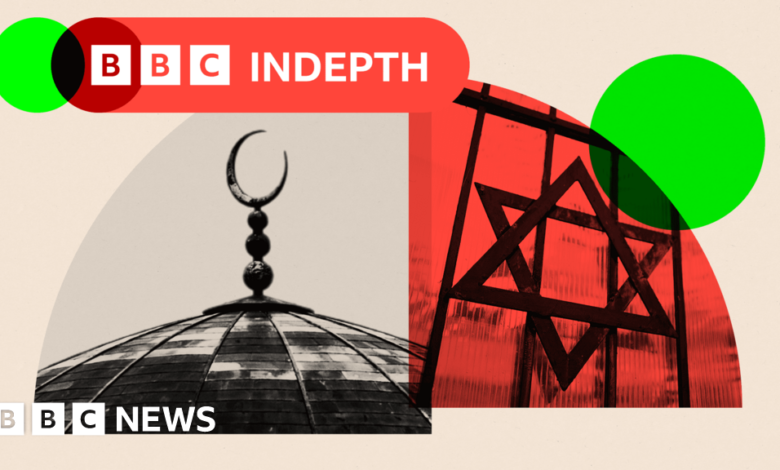Election fallout: deep shifts in Muslim and Jewish voting

[ad_1]
Except, as someone who had been inspired by Mr Corbyn from the days of Stop the War protests in the lead-up to the UK-backed invasion of Iraq in 2003, Mr Rahman was on the other side, saying that was the moment when the alarm bells started ringing for him that the party leaders were not safeguarding the values he believed in.
Mr Rahman does not see the party’s anti-Muslim slant as being limited to its response to events in Gaza. He does not question there have been serious cases of antisemitism but does not believe all accusations of racism are treated equally.
“There is a clear hierarchy of racism in the Labour Party. Some instances of racism, including Islamophobia, aren’t taken as seriously as they should,” he says.
Mr Rahman cites the case of Trevor Phillips, the former chair of the EHRC, who was suspended for alleged Islamophobia.
Mr Phillips had said British Muslims were “a nation within a nation” and previously that their opinion was “some distance away from the centre of gravity of everybody else’s”, though later he suggested this had not necessarily been meant as a criticism.
Mr Phillips was readmitted to the party in 2021 without it going to a panel inquiry.
Mr Rahman, like many other Muslims, also points to Keir Starmer’s own comments, like those made in a Sun livestream during the election campaign, when he talked of migrants being sent back to the countries they came from.
“At the moment, people coming from countries like Bangladesh are not being removed because they’re not being processed,” the Labour leader said.
“Can you imagine the Labour Party saying that about people of any other ethnicity? Saying they’re going to deport people to Israel or Ukraine or Hong Kong? It wouldn’t happen and neither should it,” says Mr Rahman.
Such is his disenchantment with Labour’s response that, coupled with wider concerns regarding the treatment of Muslims, he lays a serious charge against the party.
“I don’t doubt for a minute that Labour is currently institutionally Islamophobic,” says Mr Rahman.
Mr Rahman wants to use his voice to call out hypocrisy in the party while in government, in the hope that it will learn what he says is a lesson of this election – that no voter can be taken for granted.
Mr Rahman did give up his membership of the Labour Party once before, in protest at Tony Blair’s role in the Iraq War.
He, and other Muslims, felt persuaded to come back to the party in 2014 when the then-leader Ed Miliband condemned the scale of an Israeli operation in Gaza and the hundreds of civilian deaths.
Once again, at the same moment, Mr Langleben was seeing things very differently on the doorsteps of Jewish voters.
Even though Mr Miliband was himself Jewish, it was a time when polls were showing a rapid decline in Jewish support for Labour, particularly when the party’s 2015 manifesto talked about a parliamentary vote to recognise a Palestinian state.
“There were sometimes quite horrible conversations with Jewish voters who really cared about the issue of Israel,” says Mr Langleben.
“People in 2015 were accusing the Labour Party of antisemitism, but I think it fundamentally misread what antisemitism is. Then, it was a primarily about a foreign policy issue, Israel. That changed by 2019 when conversations were around a particular strain of far-left anti-Jewish racism,” says Mr Langleben.
For some of those supportive of the Corbyn-era leadership, that sense that criticism of Israel was being conflated with antisemitism was also something they felt occurred while he was leader.
[ad_2]
Source link




